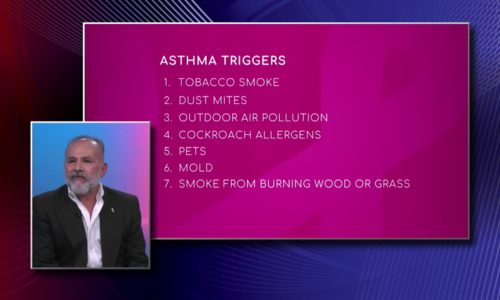Is it just a cough? |

Almost everyone has had a cough. Typically, this occurs in association with an acute infection such as a cold or the flu. Once the infection runs its course, or following effective treatment, this type of cough goes away within a matter of a few days to a couple of weeks. A cough that lasts longer than this is termed a chronic cough. By definition, a chronic cough occurs daily and lasts for at least 8 weeks (4 weeks in children). This is an important distinction because a chronic cough is usually not related to an infection. In fact, most cases of chronic cough can be attributed to three causes: postnasal drip (also known as upper airway cough syndrome), asthma, and gastroesophageal reflux disease (GERD).
Evaluating this type of cough can be a challenge for doctors because all three of these conditions can produce a similar type of cough.
Postnasal Drip
You would think that a problem affecting the lungs would be the most likely cause for a chronic cough. Instead, the most common cause is actually postnasal drip. With postnasal drip, secretions from the nose drip into the back of the throat, causing inflammation and triggering the cough. The underlying causes of postnasal drip include allergies, colds, and sinusitis. Frequent throat clearing, a constant stuffy or runny nose, and the sensation of drainage in the back of the throat are common features of postnasal drip. On physical examination, the doctor may notice redness or irritation on the back of the throat. Sinus x-rays or sinus CT (computed tomography) scan may show fluid in the sinuses, indicative of chronic sinusitis. Treatment of chronic cough due to postnasal drip includes the use of decongestants, antihistamines, and nasal steroid sprays. When clinical evidence points to the possibility that postnasal drip is responsible for the cough, the doctor may suggest a “therapeutic trial” of one of these medications. Improvement in the cough following this medication trial helps to confirm the diagnosis.
Asthma
Coughing is a primary feature of one type of asthma. In cough-variant asthma, the cough is dry and other features of asthma, such as wheezing or shortness of breath, may not be present. This type of cough can get worse with exposure to dry, cold air, dust or certain fumes or fragrances. Cough-variant asthma can be a difficult condition to diagnose since the physical examination and lung testing are usually normal in the doctor’s office. In order to confirm the diagnosis of cough-variant asthma, a special breathing test called a methacholine challenge may be necessary. In someone with asthma, methacholine will cause their airways to constrict which can be detected during pulmonary function testing. A therapeutic trial of a medication to dilate the bronchioles, e.g. Albuterol inhaler, or steroid inhalers may be tried in this condition. A reduction in coughing following the use of these medication points to asthma as the cause.
Gastroesophageal Reflux
One of the most unusual causes for a chronic cough is gastroesophageal reflux (GERD). With GERD, stomach acid backs up into the throat, triggering the cough. Often, this diagnosis can be suspected from the classic reflux symptoms of heartburn or sour taste in the mouth. If these symptoms are present, treatment for GERD may be considered to assess its effect on the cough. Treatment measures include: 1) elevating the head of the bed, 2) not eating or drinking 2 to 3 hours before bedtime, 3) avoiding certain foods, such as chocolate, alcohol, orange juice, and caffeine, and 4) taking medications directed at reducing acid production in the stomach. Medications for GERD include antacids (Maalox, Mylanta, others), omeprazole (Prilosec) and esomeprazole (Nexium).
While there are other, and in some cases much more serious, causes for chronic cough, up to 90% of cases can be attributed to one of the three causes discussed. Any cough, however, that persists past a few weeks deserves medical evaluation. The first step in finding an effective treatment is to pin down the underlying cause.
If you have any more questions just Ask Hanna, our health advisors are here to help.
Image: ©Shutterstock / Pixel-Shot








